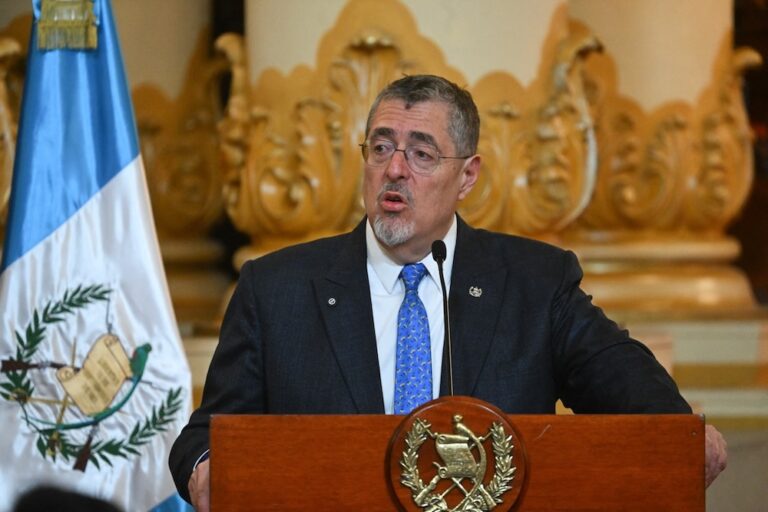(APG/IFEX) – The following is the text of a report submitted by the Guatemalan Journalists Association (APG) to a mission of the Inter American Commission on Human Rights of the Organisation of American States (OAS), during its visit to the country from 6 to 11 August to assess the human rights situation there. 10 August […]
(APG/IFEX) – The following is the text of a report submitted by the
Guatemalan Journalists Association (APG) to a mission of the Inter American
Commission on Human Rights of the Organisation of American States (OAS),
during its visit to the country from 6 to 11 August to assess the human
rights situation there.
10 August 1998
Honourable Delegates
Inter American Commission on Human Rights
Honourable Delegates:
The Guatemalan Journalists Association expresses its satisfaction at the
presence of the Inter American Commission on Human Rights in Guatemala and
sends its best wishes for the success of the mission, which the leading
organisation in the continent, the Organisation of American States, has
charged with evaluating the evolution of human rights in Guatemala over the
past several years.
Guatemala, since the “democratic opening” which began in 1986 with the
emergence of the first civilian government after a long series of
dictatorial military regimes, has experienced a slight improvement in regard
to human rights.
Nevertheless, in spite of monitoring by the international community, the
resurgence of voices that for many decades were silenced, the call for
building a state founded on the rule of law as well as the goal of
consolidating a truly democratic system in Guatemala, violations of basic
human rights persist. They no longer occur with the cruelty and on the same
scale that were witnessed in the 1970s and 1980s, but rather in a selective
and periodic manner, and show no respect for the right to life and the
security of individuals.
With the signing of the Peace Accords between the government and the rebel
forces on 29 December 1996, it was thought that the old practices of
physical, intellectual and spiritual repression would remain in the past.
Unfortunately, however, the post-war era has seen an increase in violence in
Guatemala, a situation of which the enemies of peace and democracy take
advantage in order to silence, through threats, intimidation and attacks,
whoever promotes the mechanisms that allow for the construction of a
multi-ethnic, multi-cultural and multi-lingual nation for which Guatemalans
aspire.
In this context, the Guatemalan media, imbued with the need to strengthen
the foundation that leads to a lasting peace and national reconciliation,
have been on the front line, identifying themselves with the movements to
press for, specifically, the need to strengthen the rule of law and the
democratic climate in the country.
The Guatemala media, aside from confronting the powers that be who are
resisting the changes that history is demanding for our society, now are
attacked by organised crime and drug traffickers, the predators of our
national heritage who obviously see the media and the journalists as
dangerous instruments for reporting on corruption and robbery that are
occurring in Guatemala.
The APG recognises that, in the past, there existed physical violence
against journalists, to the point of applying “censorship by death” against
any journalist who reported on human rights violations.
In the “democratic opening”, the methods have changed in order to deal with
maintaining the status quo or to slow down any progress arising from the
Peace Accords. “Nowadays, the journalist is no longer killed by bullets but
by hunger” is the phrase that is commonly heard in various circles in
Guatemala, and reflects the true situation of the national media.
Since 1991, the civilian governments have tried to de-legitimise, disqualify
and discredit the media and journalists who have no connection to
authorities or who have been critical of the workings of government.
So that the honourable delegates of the Inter American Commission on Human
Rights have an idea of what has occurred in the present decade, we offer to
you a list of journalists killed: Jorge Carpio Nicolle, director and owner
of the daily “El Gráfico”; Alberto Antonioti, who was a correspondent for
the “Eco”; Víctor Cruz, reporter for Radio Sonora; Julio Lemus, director of
the magazine “Vox Populi”; Jorge Luis Marroquín, director of the magazine
“Sol Chortï”; and news reporter Pedro Pérez.
In addition, the following journalists have been attacked: Amilcar Nuila, in
the city of Cobán, whose home was the target of a grenade attack (Nuila
covers the on-going trial of 25 members of a military patrol responsible
for a massacre Xamán); Tomás Morales, director of a magazine in
Chichicastenango, who was savagely assaulted by the bodyguards of a deputy;
Oscar Madrigal, who was the target of a machine gun attack in Puerto
Barrios; and Omar Cano, a reporter for the daily “Siglo Veintituno”, who,
after being beaten up and threatened with death, went into exile in Canada,
where he remains.
Journalist Vinicio Pacheco was kidnapped and tortured by his abductors, who
left him in the street, seriously wounded. He, too, went into exile. Axel
Cocon, correspondent for the media house, left Guatemala after receiving
several threats.
In April 1997, the editorial offices of the daily “Al Día” and of the
television news program “Notisiete” were broken into and their equipment
stolen. After being threatened, Radio Campesina, which operates out of
Tiquisate, saw two of its staff – an announcer and messenger – perish after
being shot to death. Another station, La Voz de Petén, suffered an arson
attack.
All of these criminal acts remain unpunished. The investigations made by
security forces have resulted only in a police report that is filed away in
the Public Ministry and the courts of justice.
The sole exception that can be mentioned in regard to the administration of
justice is the verdict of the Fourth Civil Court of First Instance that
convicted, in absentia, former president Jorge Serrano Elías, for having
violated the constitutional right to free speech, by carrying out a coup
d’état on 25 May 1993.
There is another type of repression that limits the exercise of free speech
and the social function of the media. Economic harassment, intimidation and
assault have been frequent in the last three years. An “invisible” action
has been to promote the “fragmentation” of media that have no links to the
present government.
Concrete examples are the cases of the magazine “Cronica” and the dailies
“El Periodico” and “Prensa Libre” that, thanks to their economic viability,
have been able to resist to clandestine campaigns to have advertising
withdrawn from those publications. Other, small media outlets –
radio-newscasters, for example – have stopped broadcasting in the face of
economic asphyxiation. Television has not been immune to this type of
pressure, to the degree that “it is being adversely affected.”
As well, even the Human Rights Commissioner was the victim of government
harassment for having condemned the Guatemalan administration for its abuses
against free speech.
The confrontation between the government and the media reached such alarming
proportions that 14 media organisations, headed by the APG, joined together
to form a united front to fight and confront state pressure. The Foreign
Press Club also expressed its concern over the sour relations between the
government and the media.
In August 1997, the Inter American Press Association held its General
Assembly in Guatemala, and among its resolutions called on the current
government “to stop the attacks on and harassment of the Guatemala media.”
At the same time, it also asked for clarification of the murder of Jorge
Carpio Nicolle. Those responsible are thought to have links to the
Guatemalan military.
Directors and publishers of Latin American media, while meeting in Mexico in
April 1997, condemned the Guatemalan government for its repressive practice
against the country’s media and called for the freedom to practise
journalism as well as guarantees for free speech.
The International Media Federation, meeting in San José, Costa Rica in March
1997, expressed its concern over the permanent governmental harassment of
the Guatemala media.
As the honourable members of the Inter American Commission on Human Rights
can appreciate, the preoccupation over the threats and attacks against the
Guatemalan media is not just a national concern; rather, it has crossed
borders and provoked the reactions of
international organisations and institutions that have called for free
speech and the free exercise of journalism without any kind of
restrictions.
This is the situation that prevails in Guatemala twelve years after having
embarked on the “democratic opening” and eighteen months after the signing
of the Peace Accords that put an end to an internal conflict that lasted 36
years.
We appreciate the significance of the presence in Guatemala of the mission
of the Inter American Commission on Human Rights, so that, in a direct and
first-hand manner, it learns more about the human rights situation in
Guatemala, gives shape to the set of ideas that gave life to the Commission
and formulates the pertinent recommendations with an aim to correcting the
errors and misconduct, for the sake of strengthening the democratic system
and of the construction of true rule of law for which the Latin American
people are asking – people who, for many years in our recent past, suffered
under the most shameful military dictatorships at a high social cost.
Yours truly,
Eduardo P. Villatoro Marco Tulio Barrios Reina
President President
Guatemalan Journalists Association
Press Freedom Commission
Jesús Abalcázar Lopez
Secretary


